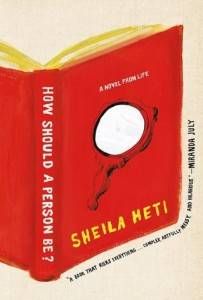
2013 Tournament of Books Discussion: HOW SHOULD A PERSON BE? by Sheila Heti
We here at Book Riot are huge Tournament of Books fans, so this year we’re going to discuss each of the finalists in the weeks before the Tournament gets underway, in alphabetical order. You can find the schedule of our discussions here. Read along with us!
Today Jodi Chromey & Liberty Hardy discuss How Should a Person Be? by Sheila Heti

LH: Oh dear. I’m a little scared. I’ll let you start.
JC: I’ll start with the bare bones of the story, which is about Sheila Heti trying to figure out how a person should be by studying and recording her friends, an artsy bunch of people in Toronto. The book follows them for a certain period of time (how long I don’t know) at some point in their lives (I have no idea how old they are) as they talk about art, creating art, and generally just stew about in their little enclave of fabulousness. I struggled with this one because many of the rave reviews mentioned how bold, daring, and provocative this book is, but to me it reads like a blog circa 2001 by someone who isn’t particularly interesting.
LH: I am having a hard time expressing how I feel about it. I didn’t like it, but I didn’t not like it, either. My feelings for this book are obtuse. There were a couple of things she said that made me laugh. But I didn’t like reading the parts that were broken up into a script (even though I get it – she’s supposed to be writing a script). And I found the rhythm to be stilted – I felt like I was reading a translation. But she is quite unusual, and I enjoyed some of her thoughts. Did that make any sense?
JC: That makes perfect sense. The book is sort of jumbled, so I can see how people would have jumbled feelings about. I’m pretty clear on my dislike, but I get jumbly when I try to explain it. It’s hard to critique because it’s not like a lot of the other books I read. It’s not plot-driven or character-driven sort of traditional fiction. It’s idea-driven meta-fiction, which is cool, but super frustrating. Mostly, though, I didn’t like it because I felt like I was stuck in a room with a bunch of assholes who thought they were brilliant but who I found totally boring. You are the most widely read person on the planet, how do you approach talking about books like this?
LH: I take the information available to me (i.e., the time I spend on the internet reading about books), so if people in the store ask about a book, I can tell them everything I know. Outside of the fact that I have read it, I can tell people that, several times, I have seen this book compared to the show “Girls.” Having never seen “Girls,” I can neither confirm nor deny the validity of this statement, but I would put it out there and hope they know what this means, and thus avoid having to remark on what I found to be its jumbliness. If they don’t know what it means, I may yell “Is that Patton Oswalt?!” and then duck behind the counter when they turn around… I am having a hard time admitting any dislike for it, because it’s supposed to be Sheila herself, so I feel like not liking parts of it is like a censure of her as a person, which makes me feel like a jerk. I am a huge wuss. Tell me why you think it made the list.
JC: Before I answer your question I have to say wanting to be kind does not make you a wuss. Even though the book is sub-titled “a memoir from life,” I think that’s some sort of marketing type artifice and believe Sheila the character is very different from Sheila the author. Maybe not, but I kind of hope so because Sheila the character was flat, mean, and self-involved. My guess it that Sheila the author is a dynamic, smart, and well-rounded person. So now on to your question.
Uhhh why did it make the list? Um. Err. . . Look, isn’t that Patton Oswalt? To be honest until I read Wallace & Greg’s disscussion of HHhH I wasn’t sure why in the hell they would have put How Should a Person Be? on the list. But when you put these two books with Building Stories by Chris Ware, I think the listmakers are trying to include books that challenge the very notion of how we tell stories, read them, and, probably, talk about them. Is that too wanky and ridiculous?
LH: No, that makes perfect sense. There are a million ways to tell people a story. (Kneeling on a stranger on a sidewalk is a bad way to do it. Or so my probation officer tells me.) How do you feel about its chances in the ToB? My money is on Building Stories or Bring Up the Bodies, even though my heart belongs to The Orphan Master’s Son. *ducks*
JC: Oh, this one doesn’t stand a chance. I’d be surprised if it made it past the first round, but that might depend on how the brackets shake out and the judge. I’ll be discussing The Orphan Master’s Son with Cassandra in a few weeks. I haven’t finished it yet so I can’t guess how it’ll do. Right now my heart is pretty evenly divided between The Fault in Our Stars and dark-horse contender The Round House.

















